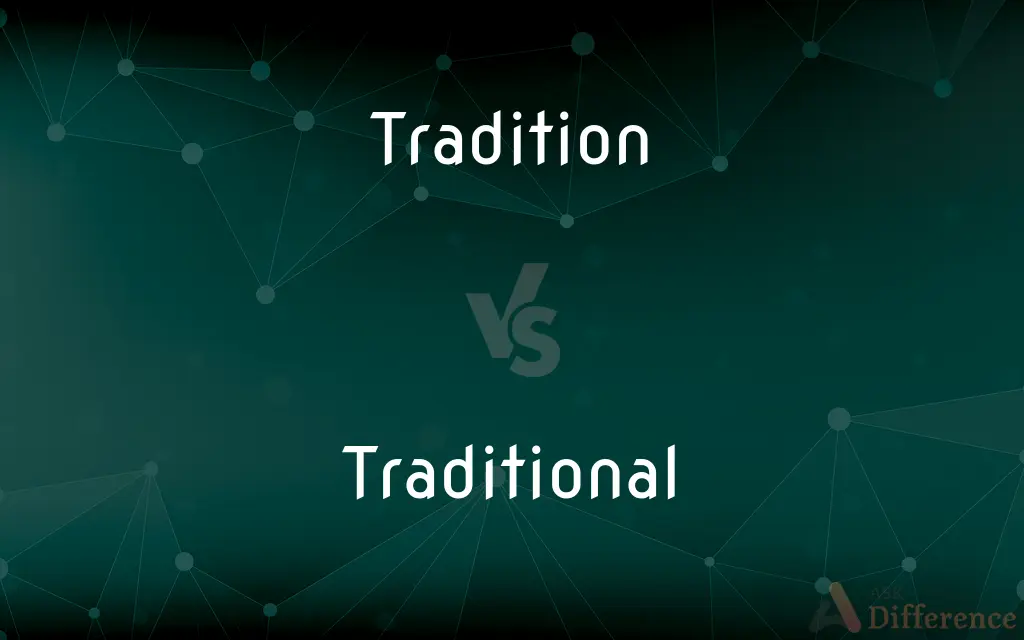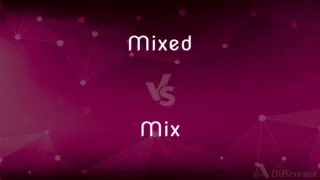Tradition vs. Traditional — What's the Difference?
By Fiza Rafique & Urooj Arif — Updated on March 14, 2024
Tradition refers to customs or beliefs passed down, while traditional describes something that adheres to these long-established customs or beliefs.

Difference Between Tradition and Traditional
Table of Contents
ADVERTISEMENT
Key Differences
Tradition embodies the collective customs, beliefs, and practices that are passed down through generations within a community or society. These can include rituals, stories, festivals, and social norms that form the cultural heritage of a group. On the other hand, traditional is an adjective that describes something—be it an object, practice, or idea—that is aligned with or stems from these long-standing traditions.
Traditions play a crucial role in shaping the identity and cohesion of a community, serving as a link between the past and the present. They offer a sense of belonging and continuity, grounding individuals within their cultural context. Traditional, as a descriptor, signifies adherence to the practices and values enshrined in these traditions, often implying a contrast with what is modern or innovative.
In the context of objects or practices, something labeled as traditional is often seen as being made or performed according to the old ways, respecting historical methods and ideas. For instance, traditional cuisine follows recipes and cooking techniques handed down through generations, encapsulating the culinary heritage of a culture. In contrast, tradition itself is the broader concept encompassing these recipes and techniques among other cultural practices.
The appreciation for traditional elements within a society can vary, with some viewing them as vital to maintaining cultural identity and others seeing them as impediments to progress and change. Meanwhile, traditions continue to evolve, absorbing influences and adapting to changing circumstances, even as they strive to maintain a link to the past.
While traditions form the tapestry of a community's cultural heritage, the term traditional is often used in a comparative sense, distinguishing between what is rooted in history and what belongs to the present or future. This dynamic interplay between tradition and the traditional shapes the cultural landscape, reflecting a society's values, history, and aspirations.
ADVERTISEMENT
Comparison Chart
Nature
Noun: customs, beliefs, practices
Adjective: describes alignment with traditions
Role
Defines cultural heritage and identity
Indicates adherence to or derived from traditions
Evolution
Subject to change and adaptation over time
Suggests a consistency with the past
Context
Broad encompassing term for cultural practices
Used to describe specific objects, practices, or ideas
Perception
Can be seen as both vital for continuity and as restrictive
Often contrasted with modern or innovative approaches
Compare with Definitions
Tradition
Traditions form the cultural heritage of a society.
The tradition of storytelling plays a key role in preserving history.
Traditional
Describes something that follows historical customs.
Traditional attire is worn during the ceremony.
Tradition
Practices passed down through generations.
Family recipes are a cherished tradition in many households.
Traditional
Often contrasted with modern practices.
Traditional medicine uses herbs and natural remedies.
Tradition
Embodies a community's identity and values.
The tradition of communal meals strengthens social bonds.
Traditional
Acts as a symbol of cultural continuity.
Traditional storytelling keeps ancient tales alive.
Tradition
Encompasses rituals, customs, and festivals.
Wearing specific attire during festivals is a long-standing tradition.
Traditional
Implies the use of historical methods or ideas.
The dish is prepared using traditional cooking techniques.
Tradition
Traditions evolve while maintaining links to the past.
The tradition of folk music incorporates contemporary themes.
Traditional
Holds significant cultural value or meaning.
Traditional crafts reflect the artisanal heritage of the region.
Tradition
A tradition is a belief or behavior (folk custom) passed down within a group or society with symbolic meaning or special significance with origins in the past. A component of folklore, common examples include holidays or impractical but socially meaningful clothes (like lawyers' wigs or military officers' spurs), but the idea has also been applied to social norms such as greetings.
Traditional
Of, relating to, or in accord with tradition
A traditional wedding ceremony.
Tradition
The passing down of elements of a culture from generation to generation, especially by oral communication
Cultural practices that are preserved by tradition.
Traditional
Of, relating to, or derived from tradition.
This dance is one of the traditional customs in the area.
I think her traditional values are antiquated.
Tradition
A mode of thought or behavior followed by a people continuously from generation to generation; a custom or usage
The traditions of Tibetan Buddhism.
Traditional
Communicated from ancestors to descendants by word only.
Traditional expositions of the Scriptures
Tradition
A set of such customs and usages viewed as a coherent body of precedents influencing the present
Followed family tradition in dress and manners.
Traditional
Observant of tradition; attached to old customs; old-fashioned.
Tradition
A precept or a body of precepts that are not written in the sacred book of a religion, such as the Bible, but are considered holy or true.
Traditional
In lieu of the name of the composer of a piece of music, whose real name is lost in the mists of time.
Tradition
A style or method of an activity or practice, especially of artistic expression, that is recognized and sometimes imitated
Satire in the tradition of Jonathan Swift.
Traditional
Relating to traditional Chinese.
The traditional form of the character has twice as many strokes as the simplified form.
Tradition
A piece of folklore
"a popular medieval tradition that identified the queen of Sheba with the Blessed Virgin Mary" (Nicholas Clapp).
Traditional
A person with traditional beliefs.
Tradition
A part of culture that is passed from person to person or generation to generation, possibly differing in detail from family to family, such as the way to celebrate holidays.
Traditional
Of or pertaining to tradition; derived from tradition; communicated from ancestors to descendants by word only; transmitted from age to age without writing; as, traditional opinions; traditional customs; traditional expositions of the Scriptures.
Tradition
A commonly held system. en
Traditional
Observant of tradition; attached to old customs; old-fashioned.
Tradition
An established or distinctive style or method:
Traditional
Consisting of or derived from tradition;
Traditional history
Traditional morality
Tradition
The act of delivering into the hands of another; delivery.
Traditional
Pertaining to time-honored orthodox doctrines;
The simple security of traditional assumptions has vanished
Tradition
(obsolete) To transmit by way of tradition; to hand down.
Tradition
The act of delivering into the hands of another; delivery.
Tradition
The unwritten or oral delivery of information, opinions, doctrines, practices, rites, and customs, from father to son, or from ancestors to posterity; the transmission of any knowledge, opinions, or practice, from forefathers to descendants by oral communication, without written memorials.
Tradition
Hence, that which is transmitted orally from father to son, or from ancestors to posterity; knowledge or belief transmitted without the aid of written memorials; custom or practice long observed.
Will you mock at an ancient tradition begun upon an honorable respect?
Naught but tradition remains of the beautiful village of Grand-Pré.
Tradition
An unwritten code of law represented to have been given by God to Moses on Sinai.
Making the word of God of none effect through your tradition, which ye have delivered.
Tradition
That body of doctrine and discipline, or any article thereof, supposed to have been put forth by Christ or his apostles, and not committed to writing.
Stand fast, and hold the traditions which ye have been taught, whether by word or our epistle.
Tradition
To transmit by way of tradition; to hand down.
The following story is . . . traditioned with very much credit amongst our English Catholics.
Tradition
An inherited pattern of thought or action
Tradition
A specific practice of long standing
Common Curiosities
How is traditional used in everyday language?
To describe objects, practices, or ideas that adhere to historical customs.
What defines a tradition?
A set of practices, beliefs, and customs handed down through generations.
Why are traditions important in a culture?
They provide a sense of identity, continuity, and shared history within a community.
What role do traditional practices play in society?
They contribute to cultural diversity, heritage preservation, and communal identity.
Can traditions change over time?
Yes, traditions can evolve while retaining core elements that link to the past.
Can something be considered traditional in one culture but not in another?
Yes, what is traditional is often specific to each culture's history and practices.
What is the significance of traditional knowledge?
It encompasses generations of wisdom, practices, and understanding, often related to the natural world and social structures.
What makes something traditional?
Its alignment with or origin from long-established customs or beliefs.
Can new practices become traditions?
Over time, if consistently practiced and valued, new customs can evolve into traditions.
Is traditional always opposed to modern?
Not necessarily; traditional aspects can coexist with and even embrace modern influences.
How can a tradition become traditional?
When its practices and values are consistently embodied in cultural expressions over time.
How does one identify traditional aspects of a culture?
By looking at the practices, objects, and ideas that have historical significance and continuity.
Are all old practices considered traditions?
Not all; traditions are characterized by their transmission across generations and cultural significance.
How do traditions influence individual behavior?
They provide frameworks for behavior, rituals, and social norms within a community.
What challenges do traditional practices face today?
They often contend with globalization, modernization, and changing societal values, which can lead to their adaptation or decline.
Share Your Discovery

Previous Comparison
Colt vs. Stallion
Next Comparison
Mixed vs. MixAuthor Spotlight
Written by
Fiza RafiqueFiza Rafique is a skilled content writer at AskDifference.com, where she meticulously refines and enhances written pieces. Drawing from her vast editorial expertise, Fiza ensures clarity, accuracy, and precision in every article. Passionate about language, she continually seeks to elevate the quality of content for readers worldwide.
Co-written by
Urooj ArifUrooj is a skilled content writer at Ask Difference, known for her exceptional ability to simplify complex topics into engaging and informative content. With a passion for research and a flair for clear, concise writing, she consistently delivers articles that resonate with our diverse audience.














































